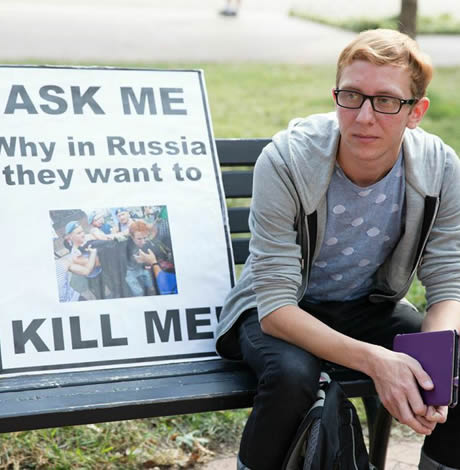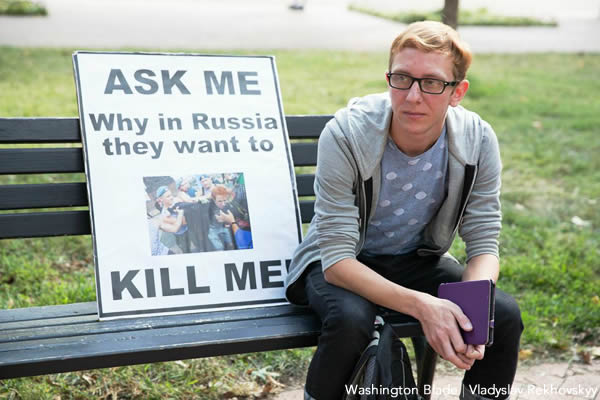News
Gay asylum seeker flees violence in Putin’s Russia
Nasonov, boyfriend left Russia in July after bloody attacks

Andrew Nasonov was at a protest in the Russian city of Voronezh against the country’s controversial proposal that sought to ban so-called anti-gay propaganda to minors on Jan. 20, 2013, when a lawyer with the country’s Orthodox Church encouraged nationalists and hundreds of other people to attack him and the handful of other LGBT rights advocates who were protesting.
He said local police questioned him about the attack before another group of people who identified themselves as members of the Moscow Criminal Investigation Department kidnapped him and brought him to a basement. Nasonov said the men took his passport, backpack and cell phone, beat him and threatened to take him to a nearby forest before releasing him five hours later.
“They tried to make me say that I had tried to murder someone,” he told the Washington Blade during an interview in Lafayette Park adjacent to the White House, speaking through an interpreter. “At the same time they assaulted me and abused me and called me gay.”
Nasonov, 25, and his boyfriend arrived in D.C. on July 2 in hopes of receiving asylum in the United States.
Nasonov told the Blade they decided to leave Russia after the Voronezh Human Rights House, a local advocacy organization with which he was connected, was attacked. Nasonov said those affiliated with the group were also targeted.
“I worked with those people,” he said. “After all those things happened, I decided to move to the U.S.”
Mother urges lawmakers to oppose gay propaganda law
Nasonov told the Blade he came out when he was 19 after “a long process.”
He does not speak with his father, and his grandmother is unaware of his sexual orientation. Nasonov said his mother cried when she found out he is gay, but she soon accepted his homosexuality.
Nasonov said his mother in a video she made urged Russian lawmakers not to approve a bill that sought to ban so-called gay propaganda to minors in the country.
He told the Blade she did not experience any repercussions from Russian authorities over her opposition to the measure that President Vladimir Putin signed in June 2013.
“She lives in a small village and they don’t have that much information about all this LGBT activity,” said Nasonov. “People know (that I’m gay) and they sometimes terrorize my mother (by asking her) do you know that your son is a ‘faggot.’ And she says OK, but he’s born this way.”
Russia’s LGBT rights abuses ‘may change’ when Putin leaves office
Nasonov, who worked as a part-time freelance reporter for Novaya Gazeta, an opposition newspaper, told the Blade he feels Russia’s LGBT rights record has continued to deteriorate since Putin signed the propaganda bill into law.
Two masked men last November attacked members of a Russian HIV/AIDS group with air guns and baseball bats as they attended a meeting of a support group in the organization’s St. Petersburg offices.
Police in Moscow and St. Petersburg in February arrested more than a dozen activists who tried to stage pro-LGBT protests hours before the opening ceremony of the 2014 Winter Olympics that took place in the Black Sea resort city of Sochi. Russian authorities detained Vladimir Luxuria, a transgender former Italian parliamentarian, twice during the games.
Bomb threats and venues abruptly cancelling events disrupted the Russian Open Games that drew more than 300 LGBT athletes from Russia and other countries a few weeks after the Olympics ended. Authorities in May arrested several people who took part in separate LGBT rights demonstrations in Moscow.
Coming Out, a St. Petersburg-based LGBT advocacy group, waged a 16-month battle against a 2012 law that requires groups that receive funding from outside the country to register as a “foreign agent.”
A local judge in July ruled Coming Out must register as a “foreign agent.”
National Organization for Marriage President Brian Brown is among the American anti-LGBT advocates who attended the International Family Forum in Moscow that ended on Sept. 15.
“As far as Putin is the head of state, there is no chance for the situation to get better,” said Nasonov. “It’s only after he resigns or whatever it is that it may change.”
Nasonov seeks to help fellow asylum seekers
President Obama, Secretary of State John Kerry, U.S. Sen. John McCain (R-Ariz.), U.S. Rep. Ileana Ros-Lehtinen (R-Fla.) and other American and European officials have repeatedly criticized Putin over his support of Russia’s gay propaganda law. The Kremlin has also faced scathing criticism from the West over the annexation of Crimea and the war in eastern Ukraine between the Ukrainian government and pro-Russian separatists.
Nasonov told the Blade the lawyer who organized the attack against him in January 2013 has recruited what he described as “volunteers” to fight in eastern Ukraine. He said this man subsequently went to the region to fight alongside the pro-Russian separatists in the country’s Donbass region that includes the cities of Donetsk and Luhansk.
Voronezh is less than 200 miles from the Ukrainian border.
“It’s just like an invasion of Russia into Ukraine,” said Nasonov.
Nasonov and his boyfriend, who have been together for more than four years and currently live in Silver Spring, have yet to formally apply for asylum because they said they need someone to translate the necessary paperwork into Russian. The couple continues to receive support from Spectrum Human Rights, an advocacy organization that works with LGBT Russians and those from former Soviet republics who are seeking refuge in the U.S.
Nasonov has also begun standing outside the White House on some afternoons with a large sign that highlights his plight and those of other LGBT Russians.
He hands passersby a flier that details his experiences in Voronezh. It also contains a picture of him laying on the ground with blood on his face after he was attacked during the January 2013 protest.
“I’m trying to tell Americans who come to the White House about the situation in Russia,” Nasonov told the Blade before he walked onto Pennsylvania Avenue and stood in front of the Executive Mansion while holding his sign. “I’m trying to put pressure on the Russian government from here and to help other Russian LGBTs who are here already who came to Washington seeking asylum.”
Editor’s note: Nasonov is the first in a series of LGBT Russian and Ukrainian asylum seekers the Blade plans to highlight in the coming weeks.

The Mexican Senate on Thursday approved a bill that would ban so-called conversion therapy in the country.
Yaaj México, a Mexican LGBTQ rights group, on X noted the measure passed by a 77-4 vote margin with 15 abstentions. The Chamber of Deputies, the lower house of Mexico’s congress, approved the bill last month that, among other things, would subject conversion therapy practitioners to between two and six years in prison and fines.
The Senate on its X account described conversion therapy as “practices that have incentivized the violation of human rights of the LGBTTTIQ+ community.”
“The Senate moved (to) sanction therapies that impede or annul a person’s orientation or gender identity,” it said. “There are aggravating factors when the practices are done to minors, older adults and people with disabilities.”
Mexico City and the states of Oaxaca, Quintana Roo, Jalisco and Sonora are among the Mexican jurisdictions that have banned the discredited practice.
The Senate in 2022 passed a conversion therapy ban bill, but the House of Deputies did not approve it. It is not immediately clear whether President Andrés Manuel López Obrador supports the ban.
Canada, Brazil, Belgium, Germany, France, and New Zealand are among the countries that ban conversion therapy. Virginia, California, and D.C. are among the U.S. jurisdictions that prohibit the practice for minors.
The White House
Four states to ignore new Title IX rules protecting transgender students
Biden administration last Friday released final regulations

BY ERIN REED | Last Friday, the Biden administration released its final Title IX rules, which include protections for LGBTQ students by clarifying that Title IX forbids discrimination based on sexual orientation and gender identity.
The rule change could have a significant impact as it would supersede bathroom bans and other discriminatory policies that have become increasingly common in Republican states within the U.S.
As of Thursday morning, however, officials in at least four states — Oklahoma, Louisiana, Florida, and South Carolina — have directed schools to ignore the regulations, potentially setting up a federal showdown that may ultimately end up in a protracted court battle in the lead-up to the 2024 elections.
Louisiana State Superintendent of Education Cade Brumley was the first to respond, decrying the fact that the new Title IX regulations could block teachers and other students from exercising what has been dubbed by some a “right to bully” transgender students by using their old names and pronouns intentionally.
Asserting that Title IX law does not protect trans and queer students, Brumley states that schools “should not alter policies or procedures at this time.” Critically, several courts have ruled that trans and queer students are protected by Title IX, including the 4th U.S. Circuit Court of Appeals in a recent case in West Virginia.
In South Carolina, Schools Supt. Ellen Weaver wrote in a letter that providing protections for trans and LGBTQ students under Title IX “would rescind 50 years of progress and equality of opportunity by putting girls and women at a disadvantage in the educational arena,” apparently leaving trans kids out of her definition of those who deserve progress and equality of opportunity.
She then directed schools to ignore the new directive while waiting for court challenges. While South Carolina does not have a bathroom ban or statewide “Don’t Say Gay or Trans” law, such bills continue to be proposed in the state.
Responding to the South Carolina letter, Chase Glenn of Alliance For Full Acceptance stated, “While Supt. Weaver may not personally support the rights of LGBTQ+ students, she has the responsibility as the top school leader in our state to ensure that all students have equal rights and protections, and a safe place to learn and be themselves. The flagrant disregard shown for the Title IX rule tells me that our superintendent unfortunately does not have the best interests of all students in mind.”
Florida Education Commissioner Manny Diaz also joined in instructing schools not to implement Title IX regulations. In a letter issued to area schools, Diaz stated that the new Title IX regulations were tantamount to “gaslighting the country into believing that biological sex no longer has any meaning.”
Governor Ron DeSantis approved of the letter and stated that Florida “will not comply.” Florida has notably been the site of some of the most viciously anti-queer and anti-trans legislation in recent history, including a “Don’t Say Gay or Trans” law that was used to force a trans female teacher to go by “Mr.”
State Education Supt. Ryan Walters of Oklahoma was the latest to echo similar sentiments. Walters has recently appointed the right-wing media figure Chaya Raichik of Libs of TikTok to an advisory role “to improve school safety,” and notably, Raichik has posed proudly with papers accusing her of instigating bomb threats with her incendiary posts about LGBTQ people in classrooms.
The Title IX policies have been universally applauded by large LGBTQ rights organizations in the U.S. Lambda Legal, a key figure in fighting anti-LGBTQ legislation nationwide, said that the regulations “clearly cover LGBTQ+ students, as well as survivors and pregnant and parenting students across race and gender identity.” The Human Rights Campaign also praised the rule, stating, “rule will be life-changing for so many LGBTQ+ youth and help ensure LGBTQ+ students can receive the same educational experience as their peers: Going to dances, safely using the restroom, and writing stories that tell the truth about their own lives.”
The rule is slated to go into effect Aug. 1, pending any legal challenges.
****************************************************************************

Erin Reed is a transgender woman (she/her pronouns) and researcher who tracks anti-LGBTQ+ legislation around the world and helps people become better advocates for their queer family, friends, colleagues, and community. Reed also is a social media consultant and public speaker.
******************************************************************************************
The preceding article was first published at Erin In The Morning and is republished with permission.
South America
Argentina government dismisses transgender public sector employees
Country’s Trans Labor Quota Law enacted in 2021

Protests have broken out across Argentina in recent weeks after the dismissal of transgender people from their government jobs.
President Javier Milei’s action is in stark contract with the progress seen in 2023, where the government’s hiring of trans people increased by 900 percent within the framework of the Trans Labor Quota Law that had been in place since 2021.
Among those affected is Sofia Diaz, a “survivor” who shared her testimony with the Washington Blade hours after she traveled from Chaco Province to Buenos Aires to protest her dismissal.
Presentes, an LGBTQ news agency, reported the government dismissed more than 85 trans employees in less than two weeks.
Diaz, 49, holds a degree in combined arts. She joined the National Social Security Administration (ANSES) in 2022 under the Trans Labor Inclusion Law. The layoffs began in January and left many people feeling uncertain and anguished. It was her turn a few days ago.
Diaz in an interview recounted how the situation became progressively more complicated, with difficulties in accessing information about her employment status and the eventual confirmation of dismissals through WhatsApp messages. This government action, according to Diaz, violates the law.
“We were on a Friday, I think on March 24, in the office and we have a WhatsApp group of other colleagues from all over Argentina who entered through the trans labor quota and they tell us if we can get our pay stubs on the intranet,” Diaz recalled. “So, I tried to enter, I could not, I talked to two other colleagues and they told me no, they could not, and so we went to another person. He couldn’t either.”
“Some people told us that it could be a system error. Well, we were never calm, let’s say not how this issue of installing fear and the perversion with which they do it ends,” she added. “This sadism of … inflicting pain and speculating with your misfortune and so on … is something that characterizes Javier Milei’s government.”
Diaz recalled a list of those dismissed from the agency began to circulate from the union in the afternoon. A colleague passed it on to her, “and well, unfortunately I was also on that list.”
“At that moment the whole weekend went by with anguish, crying, and talking with other colleagues from other places, not only trans, but everyone, everyone and everyone,” she said. “On Monday when we went to try to enter, we could not enter with the biometric, which is the thumb we had to use every morning to enter.”
Despite the difficult moment through which she is going, the trans activist stressed to the Blade that she will continue protesting and will even sue the government because her dismissal is illegal and “violates the constitution itself.”
The LGBTQ community and its allies have mobilized and organized demonstrations, highlighting the importance of defending the rights won and fighting against discrimination and exclusion. Diaz emphasized the fight is not only for the people affected today, but also for future generations, saying the historical memory of the struggles for inclusion and social justice must be kept alive.
“The Argentine government thus faces a key challenge in human and labor rights, where public pressure and social mobilization can play a determining role in protecting the rights of LGBTQ+ people,” Diaz said.
-

 State Department3 days ago
State Department3 days agoState Department releases annual human rights report
-

 Maryland5 days ago
Maryland5 days agoJoe Vogel campaign holds ‘Big Gay Canvass Kickoff’
-

 Politics4 days ago
Politics4 days agoSmithsonian staff concerned about future of LGBTQ programming amid GOP scrutiny
-

 District of Columbia1 day ago
District of Columbia1 day agoCatching up with the asexuals and aromantics of D.C.











